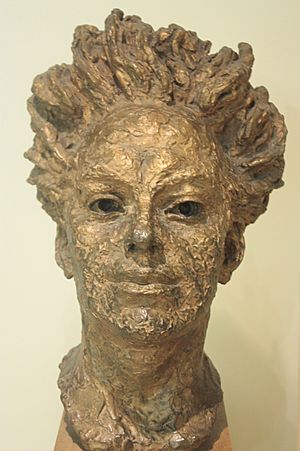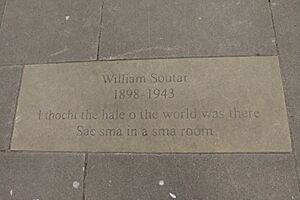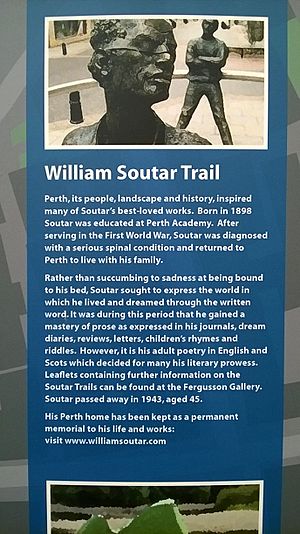William Soutar facts for kids
William Soutar (born April 28, 1898 – died October 15, 1943) was a Scottish poet. He also kept a diary. William Soutar wrote poems in both English and a Scottish language called Braid Scots. He is most famous for his short, clever poems called epigrams.
Contents
Early Life and His Writing Journey
William Soutar was born in Perth, Scotland, on April 28, 1898. His father, John Soutar, was a master joiner. His mother was Margaret Smith. William also had an adopted sister, Evelyn, who also wrote poetry.
He went to school in Perth. In 1916, during the First World War, he joined the Royal Navy. When the war ended in 1918, he became ill. In 1924, doctors found out he had ankylosing spondylitis. This is a type of arthritis that causes pain and stiffness, especially in the spine.
In 1919, William Soutar started studying medicine at the University of Edinburgh. But he soon changed to English. He began writing for the student magazine. His first book, Gleanings by an Undergraduate, came out in 1923. His father paid for it, and for some of his other early books too.
William Soutar started keeping a diary in 1919. During this time, he met other important writers. These included Hugh MacDiarmid and Ezra Pound. MacDiarmid was starting to write in "synthetic Scots." This was a special literary language. It was made up of different Scottish dialects and words from older writers.
Becoming a Key Scottish Poet
Because of these new ideas, Soutar's writing changed a lot. He became a very important part of the Scottish Literary Renaissance. This was a time when Scottish arts and literature became very popular again. Later, people who edited his work called him "one of the greatest poets Scotland has produced."
In 1927, his family adopted his seven-year-old cousin, Evelyn. This inspired him to write poems for children. His book Seeds in the Wind (1933) was a collection of "bairn-rhymes" (children's rhymes) written in Scots.
By 1930, William Soutar's illness made him bedridden. He could not get out of bed. He sadly passed away in 1943. He had caught tuberculosis in 1929. He is buried in Perth's Jeanfield and Wellshill Cemetery.
After he died, his collected poems were published in 1948. His diary, called The Diary of a Dying Man, was also published later. One type of poem he liked to write was the cinquain. He called these short poems epigrams. People have become much more interested in Soutar's work since the 1980s. This includes his poems in Scots and English, and his writings for both adults and children.
Musical Works Inspired by Soutar
Many musicians have used William Soutar's poems for their songs.
- Benjamin Britten created a song cycle in 1969. It was called Who Are These Children? and used twelve of Soutar's poems.
- Erik Chisholm set many of Soutar's verses to music. These included Summer Song and funny settings like The Prodigy.
- James MacMillan used several of Soutar's Scots-language poems. He set them to music in a style like traditional folk songs. These include "Scots Song" and "The Children."
- An album called In a Sma' Room came out in 2021. It featured settings by Debra Salem, Kevin Mackenzie, and Paul Harrison.
Books by William Soutar
Here are some of the books William Soutar wrote or that were published after he died:
- Gleanings by an Undergraduate (1923)
- Brief Words. One Hundred Epigrams (1935)
- Seeds in the Wind, Poems in Scots for Children (1943)
- Diaries of a Dying Man (1954) ISBN: 0-86241-347-8
- The Collected Poems of William Soutar, edited by Hugh MacDiarmid (1948)
- Poems of William Soutar: a New Selection, edited by W. R. Aitken (1988) ISBN: 0707305543
- The Diary of a Dying Man (1991) ISBN: 0906772311
- At the Year's Fa': Selected Poems in Scots and English (2001) ISBN: 0905452356
More Information Online
- You can find some of Soutar's poems on The Scottish Poetry Library site: [1].
- More poems are available here: [2] and [3].
- See examples of Soutar's cinquains here: [4].
 | Misty Copeland |
 | Raven Wilkinson |
 | Debra Austin |
 | Aesha Ash |




